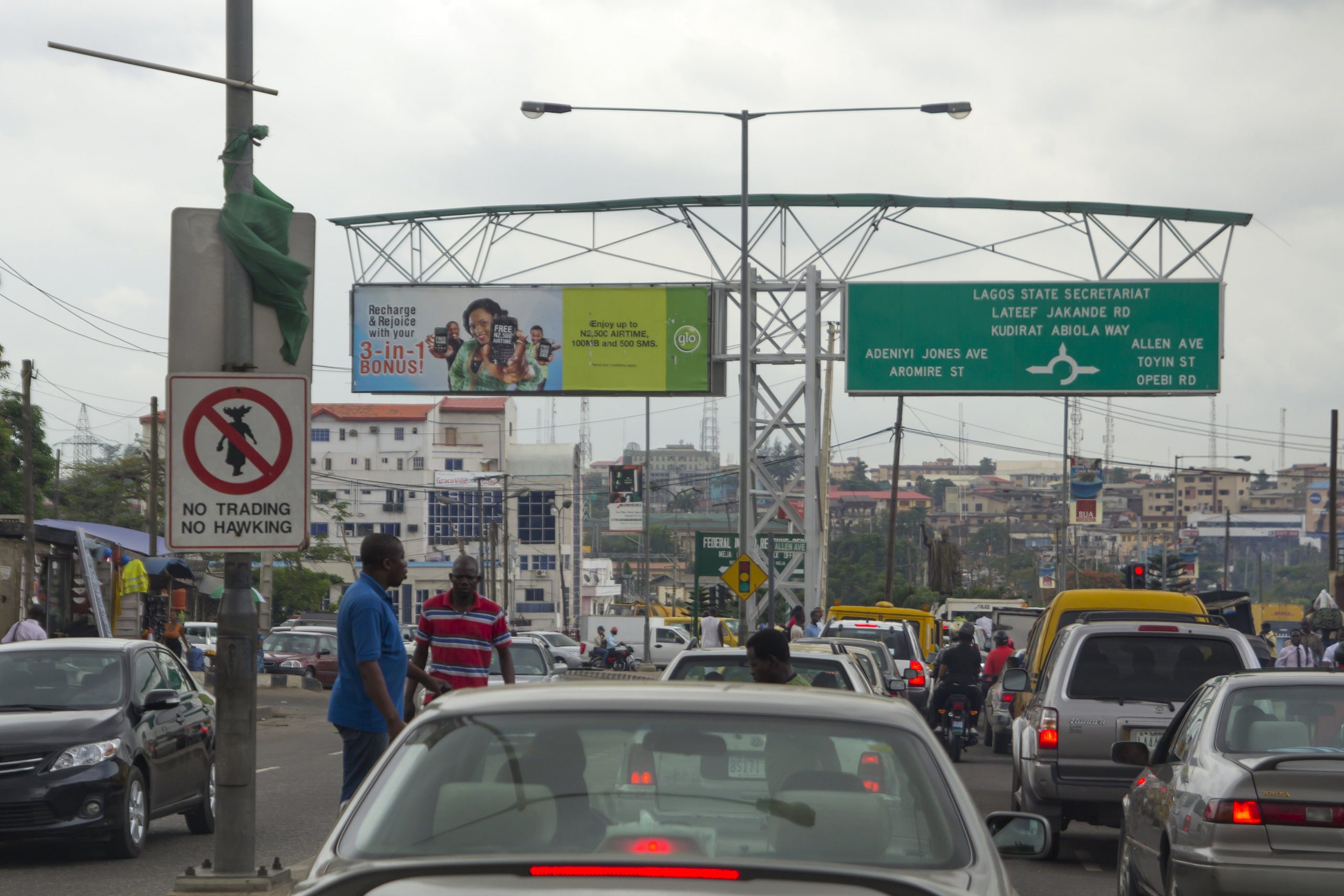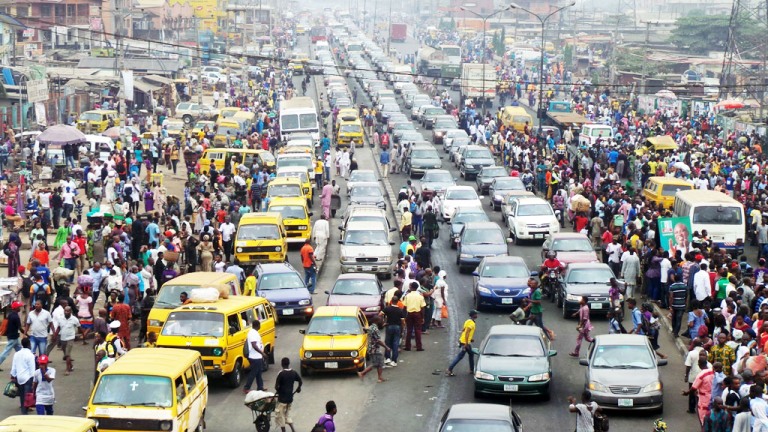
Economic Costs of Traffic Congestion in Lagos
One would think that a mega-city with the fifth largest economy in Africa would have one of the most efficient transport networks on the continent that effectively connects businesses to labor and product markets, and enables productivity increases. Call it the Lagos paradox: the mega-city’s $136 billion economy isn’t growing as it should because despite the abundant supply of skilled and driven labor force, it is less productive due to its fragmentation and connectivity problem. There is only 2.2 km of road per 10,000 people in the mega-city, one of the lowest in West Africa. Lagos has 264 cars per kilometre as against 11 cars per kilometre world average. In addition to the glaring infrastructure deficit, the heavy reliance on road transportation has aggravated the traffic congestion woes and amplified its effects on Lagosians finances, health, emotional well-being and productivity.
The concentration of businesses and some of the biggest markets on Lagos Island and the sprawl on the mainland causes regular traffic jams along the long but limited routes that connect both geographical divides. We found that Lagosians spend 2.21 hours daily in traffic congestion, commuting to work. The closing of the Third Mainland Bridge for maintenance works has worsened the situation.
The gridlocks make neither naira nor sense
At the Transport and Traffic Conference, a public-private sector dialogue organised by the Danne Institute for Research, the president of Lagos Chamber of Commerce and Industry, Mrs. Toki Mabogunje, explained that Lagos infrastructure gap is wide and difficult to close because growth has outpaced planning for decades. The resulting gridlocks affect individuals in many ways: the number of productive hours wasted in traffic, additional money that could have been saved or used to care for the family spent on transport, health problems due to regular exposure to air pollution and so on. Its effects on businesses and their growth are also colossal. Traffic delays affect productivity and efficiency, lead to spoilage of goods before they reach their destination and contribute to insecurity on the roads.
Danne Institute for Research partnered with Financial Derivatives Company to estimate the financial and economic cost of traffic congestion to individuals and businesses in Lagos. The financial cost to individuals is the extra amount of money they spend on transport or use to fuel their cars every day due to traffic congestion. We found that on the average, the additional amount spent by car owners on fuel weekly due to traffic congestion is N3,044.97 (range, the difference between the highest and the lowest amount, was N16,800). Public transport users reported that the extra amount they spend every week due to traffic delays is N1,796.35. In essence, we found that traffic congestion costs Lagosians who use public transport N79,039.40 each year in extra transport fares and those who own their vehicles N133,978.68 annually in extra fuel costs. Considering the poverty levels and income disparity in the state, this is money that could have been saved or used to send a relative to school or provide them a means of livelihood.
There is only 2.2 km of road per 10,000 people in the mega-city, one of the lowest in West Africa. Lagos has 264 cars per kilometre as against 11 cars per kilometre world average.
Ovadje (2015) in her Talent Model posited that a number of factors affect the productivity of talent. She found in that study that a major constraint to talent (labor) productivity in Lagos is traffic congestion. After going through the inescapable dawn and dusk traffic congestion, employees get home to “address the electricity problems, noise and pollution from generators, etc.” This, the study shows, affects how creatively and productively an employee works the following day.
Mr. Wale Adediran, the president of the Chartered Institute of Personnel Management (CIPM), at our virtual Transport and Traffic Conference, aptly captured the other costs of the Lagos traffic congestion to individuals as the PIE Problem – Physical, Intellectual and Emotional. He explained that many Lagosians sit or drive for hours in traffic while going to and coming from work every day. They end up having some back problem or the other. Being stuck in traffic every day with few hours to sleep keeps Lagosians perpetually exhausted and less creative or even retentive. The constant fatigue from traffic congestion also leads to emotional stress and frustration, etc.
In essence, we found that traffic congestion costs Lagosians who use public transport N79,039.40 each year in extra transport fares and those who own their vehicles N133,978.68 annually in extra fuel costs.
We also estimated the economic cost of traffic congestion to businesses in the Lagos mega-city. This is the opportunity cost of time spent in traffic congestion every day. Our findings show that Lagosians lose an average of 2.21hours to traffic congestion while commuting to work each day. We multiplied the man hours lost to traffic by the weighted average hourly wage for four cadres of staff in micro, small and medium sized businesses.
Our findings show that the annual economic cost of traffic congestion to micro, small and medium sized businesses is between N600,053.90 and N5,400,478.20; N4,620,532.10 and N29,402,608.90; and N33,002,661.70 and N149,413,255.00 respectively. The total loss to Lagos is N3,834,340,158,870 per annum (almost 4 trillion Naira!).
These figures are depressing especially considering how much businesses could have grown if the cities were more connected; and how many more businesses could have plugged into the international markets if the route to Apapa were easily accessible.
Government needs the private sector to tango
Considering the magnitude of losses to private businesses, they cannot simply wait for the government to solve the traffic congestion problem. Nigeria entered its second recession in 5 years and the pandemic has contracted the nation’s economy by 6.1 percent in the second quarter of 2020 alone, the steepest decline in the last 10 years. As a result, some state governments can’t even pay salaries. Private capital is direly needed to fund projects especially in rail and water transportation that will take pressure off the few roads, create options for the masses and move millions of Lagosians across the mega-city every day.
How do we increase the productivity of employees? This should be a major concern of senior management. Should we institutionalize working from home? How do we ensure performance and engagement while working from home? What percentage of staff have long commutes to work each day? Should we change our company headquarters? If we have a branch network, should we reassign employees to work in the branches closest to them? Ultimately, how do we increase productivity and reduce the cost of traffic congestion to the business and the human cost to employees? The earlier senior executives find answers to these questions, the better for their organisations.
Finally, business has to put pressure on government to solve the traffic congestion problem in Lagos. This problem has been around for far too long. Nigeria is described as Africa’s biggest market because of its large population and by sharing 26.7% of the country’s GDP and over 50% of non-oil industrial capacity, Lagos is at the heart of this strategic position. The potential of the Lagos market, considering its population and lower poverty per capital, is enormous and it should be realized. Connectivity is the very first step in setting the ball rolling. A well-connected mega-city will be quite something to behold.




